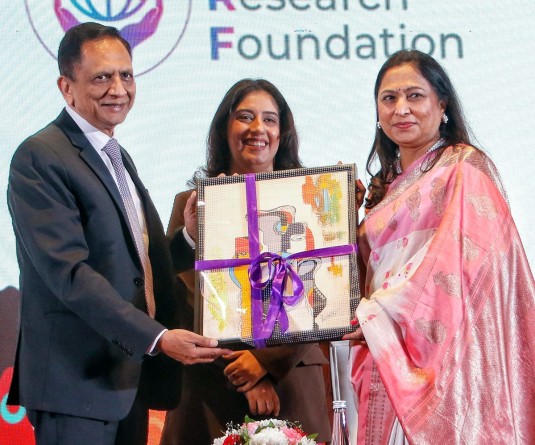Parental depression can affect kids

New Delhi, April 25 (IANSlife) Parental depression changes a child's experience of the world internally and externally.
There is a marked difference in the way parents interact with children when depressed and this impacts a child's development. In some societies where discussing mental health is a taboo, it becomes hard to accept or express the need to seek help for individuals raising kids.
"Some of the consequences of paternal depression are based on the child's developmental age. Researchers have observed less-sensitive parenting in both mothers and fathers who are depressed, though much less research has been conducted with fathers. There are several studies that show depressed mothers have been found to express themselves to their babies and sometimes give less eye contact. Parental depression impairs several activities of parenting. Even a simple activity such as reading a bedtime story to a child may get affected. A depressed parent may not be as lively or as expressive," says Dr Ranjan Ghosh MD Psychiatrist, Good Karma.
Isolation may also occur for the parent and therefore also the child. As parents go through impairment of social and occupational functioning the child may also go through difficulties with not being tended to or being more isolated than peers, he adds.
Affects of Parental Depression at different stages of A child's growth:
Prenatal: Inadequate prenatal care, poor nutrition, higher preterm birth, low birth weight, pre-eclampsia and spontaneous abortion
Infant
Behavioural: Anger and protective style of coping, passivity, withdrawal, self-regulatory behaviour, and dysregulated attention and arousalCognitive: Lower cognitive performance
Toddler
Behavioural: Passive noncompliance, less mature expression of autonomy, internalizing and externalizing problems, and lower interaction
Cognitive: Less creative play and lower cognitive performance
School-age
Behavioural: Impaired adaptive functioning, internalizing and externalising problems, affective disorders, anxiety disorders and conduct disordersAcademic: Attention deficit/hyperactivity disorder and lower IQ scores
Adolescent
Behavioural: Affective disorders (depression), anxiety disorders, phobias, panic disorders, conduct disorders, substance abuse and alcohol dependence
Academic: Attention deficit/hyperactivity disorder and learning disorder
4 Things we know about Parental Depression
Unaddressed Parental Depression
There is a strong link between a parents' mental health and their children's development. Parents who are depressed may experience difficulties with their mood, thinking, and ability to engage in everyday activities, such as sleeping, eating, and working. Compared to parents who are not depressed, they are also more likely to engage in negative parenting behaviours (e.g., to be hostile, withdrawn, abusive, neglectful), and less likely to be warm, sensitive, and responsive to their children's needs.
Untreated Parental Depression
Research has shown that children of parents with untreated depression have higher rates of behaviour problems, difficulty coping with stress and forming healthy relationships, academic problems, and mental illness, compared to children whose parents are not depressed. The chances of poor child outcomes are increased when a parent's depression is severe or chronic, begins early in a child's life, or is accompanied by other risk factors (e.g., poverty, family violence, discrimination, substance abuse, other health and mental health problems). Depression during pregnancy may also have adverse effects on the fetus. Therefore, early identification and treatment of parental depression are essential.
Treatment
Treating depression is usually effective, yet rarely addresses depression's potential impacts on parenting or children. Even when it is severe, parental depression can be treated effectively, often through a combination of psychotherapy, medication, and mind-body practices (e.g., yoga, meditation, and other forms of self- care). However, current treatment approaches rarely address the effects of depression on parenting or children.
Ray of Hope
A number of interventions have shown promise for improving outcomes among children with a depressed parent. Interventions help children gain awareness that their parent has an illness, understand that the illness is not their fault, and develop coping skills. Service delivery strategies that focus more broadly on healthy parenting and child development (e.g., home visiting, mental health consultation, child and parent psychotherapy) also have better program outcomes when they address parental depression (e.g., through identification, screening, referral, and/or treatment). However, additional efforts are needed to develop and evaluate these interventions and to make adaptations to address cultural and linguistic diversity and to reduce health disparities.
Yoga as an answer
"Children are like flowers that bloom into their highest selves with the right care and attention. When the environment that they are raised in is chaotic, with no emotional regulation, lack of boundaries and shared distress; this gets reflected in their personalities as well. All of us have an inner child that requires 3 important things - to be seen, to be heard and to be loved. And, in order to get these needs fulfilled, children will manipulate themselves according to their surroundings suiting the care-givers' conditions. Unfortunately, this leads to childhood trauma and sets their personality showing up in their adulthood and all through their lives unless they undo this harm caused to them," says Yoga guru Grand Master Akshar.
"Parents need to learn to regulate their emotions, and address the three needs of the child without adversely influencing them. As individuals, if we choose to become parents, we are responsible first for our own health and this is not limited to the physical alone. Unless we are mindful, aware and informed adults, we will be doing a great disservice to the child, as well as to the society and the world at large by producing severely maladjusted people," he adds.
Yoga, through the practice of asanas, pranayama and meditation can develop the quality of mindfulness within you. All three are important, bringing holistic benefits to your mind, body and spirit. Practice Surya Namaskar or Sun Salutation along with pranayama and meditation practice in your daily routine to experience the various benefits of mindful living.
Yoga asanas are very beneficial for the entire body including your muscles, joints, cardiovascular system, nervous system, circulatory and lymphatic systems. Asanas can balance the entire nervous system and your energy centres. A form of psychosomatic exercises, asanas strengthen both the mind and body bringing harmony and stability to the practitioner.
Pranayama are different breathing techniques or exercises that improve your lung capacity. This ensures that more oxygen gets into your lungs adding benefits for the heart too. Pranayama also improves the kidney function and nervous system. Kumbhaka or retention is known to facilitate the working of the lungs by increasing the supply of oxygen and improving the exchange of oxygen and carbon dioxide which also helps with the brain.
Meditation can be attributed to increasing the level of kindness and compassion within us for others. Regular practice of mediation also leads to greater empathy, tolerance, forgiveness and patience, reducing anger and hostility. It helps us gain focus, improves our ability to prioritise, to be more motivated and independent. It removes negative thoughts, stress, worries, anxiety which can prevent us from feeling happy.






